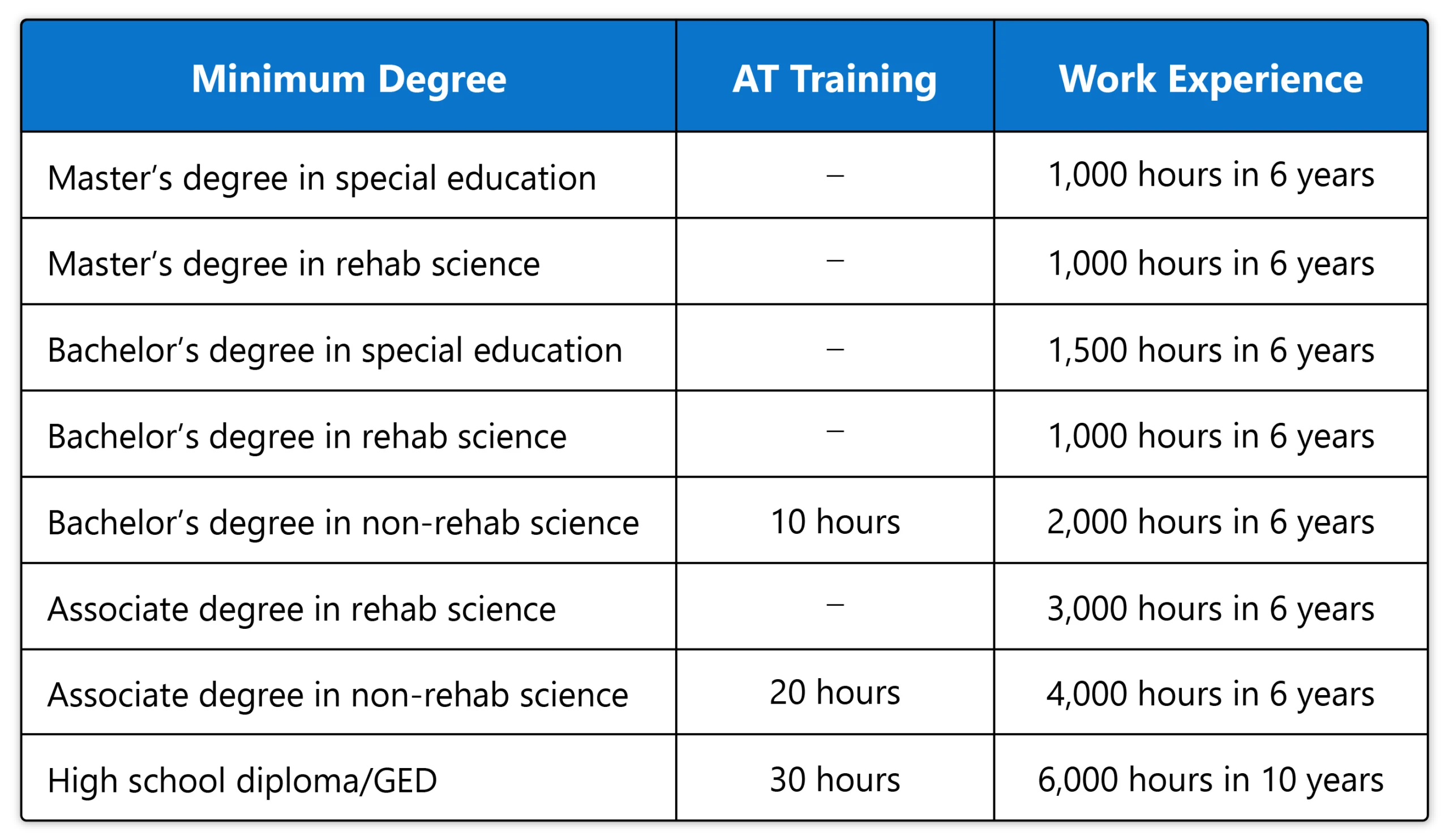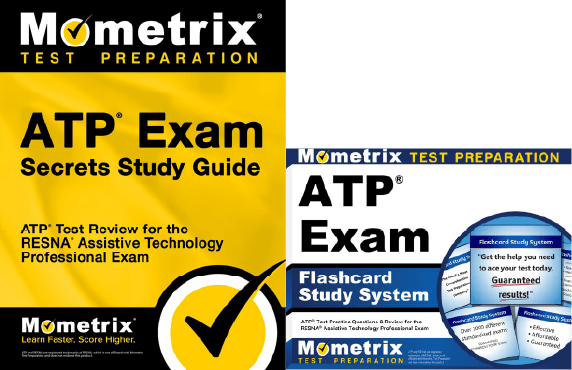If you need help studying for the Assistive Technology Certification (ATP®) exam or just want some more information about what the exam is like, you’ve come to the right place.
Click below to take a free ATP practice test!
What’s on the Exam?
How to Register
Exam Scores
Retaking the Exam
What Test-Takers Are Saying
FAQs
Exam Eligibility
Before you can register to take the ATP written exam, you’ll have to meet the eligibility requirement that matches your level of education:

If you meet the necessary requirements, you’re set to begin the registration process!
What’s on the Exam?
There are 180 multiple-choice questions on the exam, and the time limit is 4 hours. There aren’t any scheduled breaks, but you’re free to take restroom breaks as needed.
Let’s take a closer look at the different sections of the exam.
1. Assessment of Need
29% of the exam
- Reviewing the referral to identify assessment needs and prioritize them
- Reviewing anticipated settings of use to assemble the assessment team
- Consulting with stakeholders to gather relevant insights
- Reviewing records to gather essential background information
- Planning the assessment to accommodate client needs and constraints
- Collaborating with stakeholders to assess functional abilities and limitations
- Assessing environmental factors affecting the use of assistive technology
- Assessing the effectiveness of existing assistive technology
- Initiating requests for referrals or services as necessary
- Gathering and organizing information from stakeholders to guide assessment
- Assisting the client in prioritizing goals and outcomes
- Hypothesizing assistive technology solutions for future needs
- Presenting assessment findings and demonstrating interventions
- Facilitating decisions to determine intervention strategies
2. Development of Intervention Strategies – Action Plan
29% of the exam
- Informing clients and stakeholders about their rights, responsibilities, and complaint processes
- Identifying issues of integration across environments where the client interacts
- Defining potential intervention products, services, and strategies
- Identifying adaptations or products that match the client’s abilities, goals, and preferences
- Determining the appropriateness of commercially available or custom solutions
- Comparing technology under consideration with previously used options
- Conducting demonstrations, trials, and basic training with clients and stakeholders
- Identifying measurable objectives and analyzing data to select solutions
- Seeking and integrating feedback from clients and stakeholders after trials
- Identifying or assisting in determining training, services, and support needs
- Documenting feedback and data from trials to monitor progress
- Assisting clients and stakeholders in selecting technology solutions by explaining options
- Documenting recommendations for technology, services, and follow-ups
- Identifying and advising stakeholders about the procurement process
- Submitting recommendations for procuring assistive technology solutions
3. Implementation of Intervention (Once Funded)
23% of the exam
- Reviewing and confirming the implementation plan with clients and stakeholders
- Initiating and monitoring the procurement process
- Preparing, assembling, and installing the technology before delivery
- Verifying the product’s safety, performance, and quality prior to delivery
- Fitting and adjusting the technology to meet client requirements during delivery
- Training clients and stakeholders in device use, care, and troubleshooting
- Providing information on warranty, maintenance, and follow-up needs
- Verifying the client’s ability to use the equipment to achieve desired outcomes
- Providing recommendations for ongoing training or services to meet goals
- Educating clients and stakeholders about changes that may require adjustments
- Documenting the implementation process and sharing updates with stakeholders
4. Evaluation of Intervention (Follow-up)
19% of the exam
- Documenting outcomes and communicating them to clients and stakeholders
- Developing a plan to review the achievement of goals and outcomes
- Identifying changes in client functions, goals, or equipment performance that require reassessment
- Assessing outcomes and modifying intervention strategies to address changing needs
5. Professional Conduct
N/A
- Maintaining compliance to RESNA®‘s Code of Ethics and Standards of Practice
- Participating in opportunities to advance the field of assistive technology
How to Register
Once you’ve ensured that you meet the eligibility requirements, you can register for the exam!
To get started, you’ll need to submit an application on RESNA’s website. The application will ask you for your contact information and any documentation to prove your eligibility (among other things).
When you submit the application, you’ll also need to submit the application fee, which is $125. If you’re an RESNA member, your application can be submitted for free!
Once your application is approved, you’ll be able to register for the exam and schedule a testing appointment.
Exam Scores
The test is scored using a scaled scoring method. Here’s how it works:
For every question you answer correctly, you get one point added to your raw score. At the end of the test, your final raw score will be converted to a scaled score. This scaled score will range somewhere between 200 and 800.
The reason your raw score is converted to a scaled score is because everyone who takes the ATP written exam is given a slightly different set of questions. Since everyone has a different arrangement of questions, and because some questions are harder than others, converting your raw score to a scaled score ensures a more even playing field.
Retaking the Exam
If you didn’t get a passing score on your first try, that’s okay! You can retake the test after a 90-day waiting period.
Keep in mind that you will have to pay a retesting fee of $250 for your first retake—every attempt after that will cost the full $500.

Online ATP Prep Course
If you want to be fully prepared, Mometrix offers an online ATP Prep Course. The course is designed to provide you with any and every resource you might want while studying. The ATP Course includes:
The ATP Prep Course is designed to help any learner get everything they need to prepare for their ATP exam. Click below to check it out!
What Test-Takers Are Saying
Don’t just take our word for it! See what real test-takers are saying about the ATP exam:
“Make sure you understand seating and positioning. Make sure you understand the psychological impact of acquired disability. If you don’t know educational and communication, get knowledge there. But seating and positioning is a must.”

Jeannette
“The exam assumes you know all your A&P and what conditions follow from a specific injury and need which solutions. It also assumes you know all your clinical terminology. Know all the legislation—there is a fair amount of questions on such things and professional ethics.”

Shadowwynd
“You need to know more than just seating and mobility, as the exam cuts across all areas of AT at a basic level. But it’s more about the AT process and general features than product specifics. There are no US-centric funding questions, just general knowledge of funding process is needed.”

Daniel
FAQs
How hard is the RESNA ATP exam?
The ATP exam is pretty challenging, with a pass rate of only 66% according to RESNA.
How many questions are on the ATP exam?
The exam contains 180 multiple-choice quesitons.
What is the time limit for the ATP exam?
The exam is timed at 4 hours.
What is the passing score for the ATP exam?
You’ll need to get a final scaled score of at least 600 to pass.
How much does the ATP exam cost?
The testing fee is $625.
ATP and RESNA are registered trademarks of RESNA, which is not affiliated with Mometrix Test Preparation and does not endorse the information on this page.



 ATP Online Course
ATP Online Course ATP Study Guide
ATP Study Guide ATP Flashcards
ATP Flashcards
